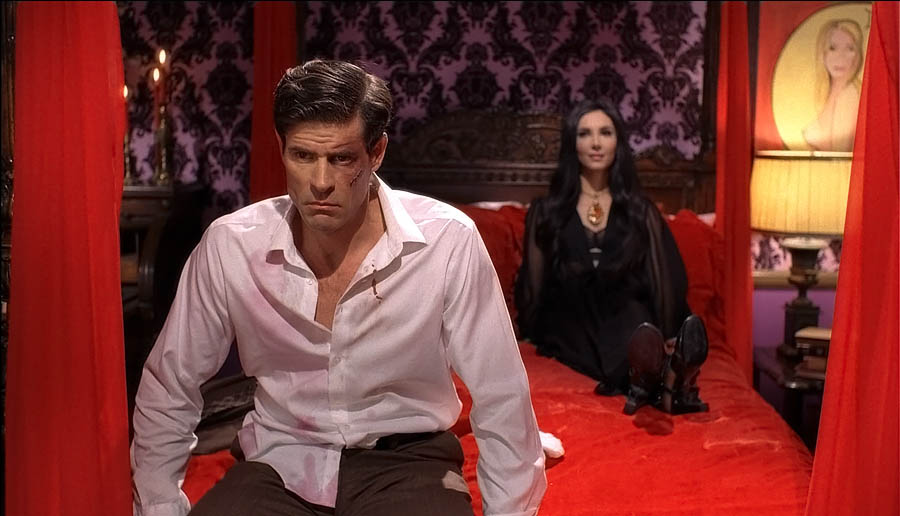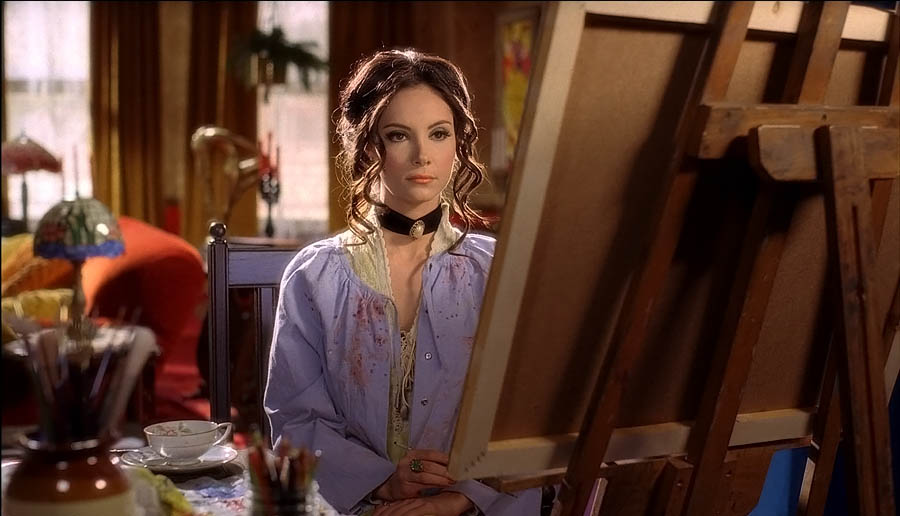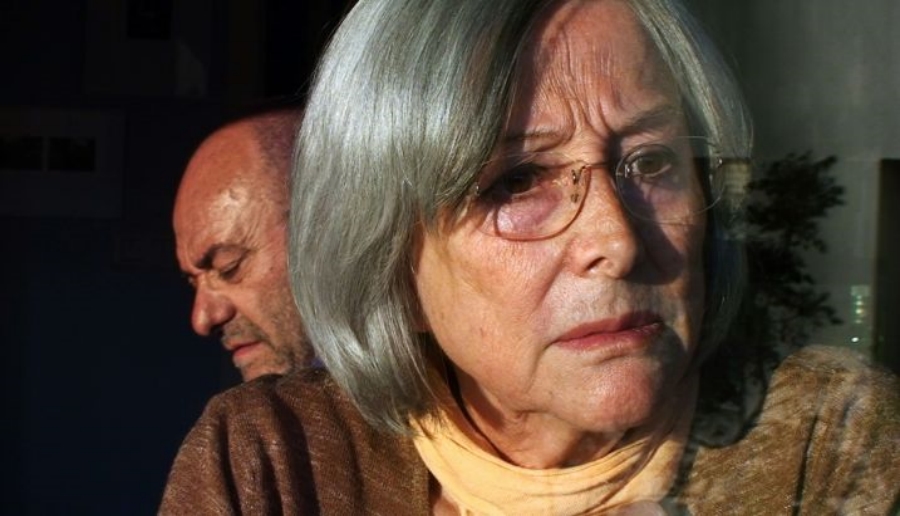The Love Witch and The Academy of Muses: Musings on two very different but thoughtful programming selections on the fest’s final day
The final presentation at this year’s Wisconsin Film Festival was The Love Witch, a gleefully retro homage to everything from Jacques Demy’s Donkey Skin (1970), Hitchcock’s Marnie (1964), to Jess Franco’s whole risqué filmography (projected on 35mm, no less), vividly expressed in Anna Biller’s eye-popping, exquisitely hand-crafted production design. The film’s overtly silly satire of antiquated sexual politics and seventies television crime procedural is likely to diminish its carefully constructed look at gender roles in relationships, particularly amidst its dizzying cultist rituals. As the titular pouty-lipped witch Elaine (Samantha Robinson) seduces the latest man she fancies, Griff (Gian Keys), the chiseled Adonis of a detective, alternating voiceovers articulate their inner desires and prevailing viewpoints that divide women and men. Imaging a future together, Elaine expresses an undying affection where she would become so well-acquainted with a man to be able to predict and linger on his charming habits and idiosyncrasies; Griff asserts the exact opposite in that knowing someone so completely, they lose a kind of mystical, idealistic quality. Essentially, his vision of a woman would no longer be of a muse to be worshiped but rather reduced to the realm of, well, his fellow men. It’s one of the film’s few poignantly profound moments, conveyed with certain comedic intent but with a darker resonance that carries over into the origins and traditions of cinema that precede Biller’s film by an upwards of a hundred years.
Actually, it dates back much further, argues director José Luis Guerín in The Academy of Muses, which screened earlier in the day at Sundance Cinemas on the final afternoon of the festival. Interestingly, the two tonally disparate films share a similar subject in the representation of women in art throughout history. But the unique amalgamation of verité documentary and fictional narrative forms, shot at the University of Barcelona with philology professor Raffaele Pinto and his “protégées” (an equal amalgamation of real students and actors), plays to a much different audience both within the context of the frame and beyond it. In this film-as-academic-prompt approach, Guerín’s leading lecturer, the loquacious Pinto, instigates a discourse about love as the most noble of passions (with reference to Dante’s Divine Comedy and Greek mythology in Apollo, Orpheus, Eurydice, etc.) Pinto’s own wife Rosa (Rosa Delor Muns) then refutes him, claiming love is an invention of the aforementioned literature that has created not only unrealistic expectations but palpable ramifications that can be observed in the context of the film. The conversation at their home feeds into the dense daytime discussions in the classroom broadly grouped under the professor’s idea of women as muses for men in their fiction and in own realities. But while Pinto intends this definition to be reverent of beauty and meaning (“Without muses, poetry becomes solipsistic,” he says), it’s also reductive in the way it denies women intellectual power and authority, the very power he wields and is privilege to throughout the film and his actual career.
As the calendar shuffles from late November through December and January, the title of The Academy of Muses becomes progressively misleading and astutely withholding. Guerín positions himself as a feminist by gradually turning his attention away from Pinto to the majority of female characters/students, who “rise up against their passive role by redefining traditional notions of beauty, desire, and love” (writes Manuel Yáñez-Murillo of Film Comment), the same that exist in the lavish Technicolor-imitative fantasy of Anna Biller’s Love Witch. On the nature of human portraiture and gaze, The Academy of Muses carefully confronts notions that have existed in both commercial cinema and erudite texts alike. In example of the latter, John Berger’s Ways of Seeing, published in 1972, is famously quoted: “Men act and women appear. Men look at women. Women watch themselves being looked at. This determines not only most relations between men and women but also the relation of women to themselves.” Isolating the first three simple sentences that reflect upon female representation in media, a sense of perverse reciprocation emerges, an entrenched viewpoint, and spell that demands to be broken. The film’s gentlest but maybe most effective retaliation may be in student Mireia (Mireia Iniesta)’s story about developing feelings for a male poet online who comforted her during her father’s illness. Of course, Mireia’s fellow classmate insists that she has, inadvertently succumbed to a kind of male gaze, creating an ideal out of someone in the absence of physical interaction.
Is there something gender-specific to the act of seeing, or is it universal to conflate physical beauty with spiritual? It’s more common to hear about “men as more visual creatures,” but is this expression a myth cultivated and reinforced by the most marketable media in society? Why is human fallibility viewed as something nonnegotiable in a relationship; is it all in the insatiable aspiration to be virtuous, to be better than the skin we’re born in? Like any valuable class or film, The Academy of Muses (as both?) is less concerned with absolute transparency and an end-all moral answer to its tableau of heady questions than it is in fostering a boundless dialogue about representations of masculinity and femininity in classical and progressive regards. Guerín’s tenderly focused handheld lens can produce a sense of disorientation by cutting from one shot/scene to the next rather rapidly, including a literally harmonious expedition to Sardinia, but its steady rhythm and evolution of ideas compensate for an early lack of visual storytelling. The film embraces something uniquely epic in a concise ninety-minute experience through its marriage of micro-budget documentary and narrative elements. As in The Love Witch, once again, The Academy of Muses creates a forum for not only women to reciprocate but actively change the way in which art is thought to be most actively controlled by men. This lofty ambition cannot rest upon the shoulders of one director, male or female, but The Academy‘s effusive language strikes a moving and occasionally humorous tone about what it has meant to be inspired, to love in the past tense, and what a more egalitarian future may resemble. And that’s an honestly noble thought to leave the Wisconsin Film Festival with.




“The film’s overtly silly satire of antiquated sexual politics and seventies television crime procedural is likely to diminish its carefully constructed look at gender roles in relationships.” Can you explain how THE LOVE WITCH is an overtly silly satire, whereas Guerin’s film is a “serious” film? Do you think that texts in films are only the spoken texts, and is that why you ignore the rich visual texts that show through a series of images in THE LOVE WITCH what Guerin’s film presents mainly though the spoken word? For it is precisely these visual texts, which play with a woman’s struggle with whether or not to enact the role of a man’s fantasy, that are the visual representations of Guerin’s thesis about women as muses, that you dismiss as “silly.” I was hoping when I read the title of this piece that it would be about the real difference between the films, which is that one film is from the male point of view, the other from the female point of view. And whereas Guerin’s film ends with classical artworks juxtaposed with shots of the “muses” of his, film, suggesting that all women are muses whether they like it or not, and that that is their primary function in the world (at least as far as his camera goes) THE LOVE WITCH posits this defining of the female through the male gaze as the reason for madness and misery in the female. So much for “silly satire.”
Hi, Anna. Thanks for commenting. A little background: When I began writing this feature, I wasn’t sure of my intention; I eventually decided to address some of the topics that The Academy of Muses broached, at least as my diligently scrawled notes reflected after the afternoon’s screening. By comparison, I was not jotting anything down during The Love Witch, as I essentially selected it, based on promotional description, as a fun finale to all the ponderous and generally self-serious art house fare that occupies most of my time. However, as I assessed The Academy of Muses in my mind, I also distinctly recalled the voiceover in your film as a demonstration of the lectures and dialogues in Guerín’s.
Honestly, I’ve come to the conclusion that what I’ve written here is inadequate and incomplete; it’s just an outline for something more focused that might inevitably be a dissertation (but probably not mine, as I’m not a grad student). So, you aren’t wrong in your assumptions. But, just because one film is directed by a man and another by a woman doesn’t necessarily mean that each film is so rigidly aligned with their respective gender perspectives throughout. At least, I tend to notice a fluidity in my viewing anything from new micro-budget cinema to the sixties New Waves. Your interpretation of the final succession of shots in The Academy of Muses is valid, but I thought of it differently as I developed this feature. Might we consider the inanimate/dead statues and works of art transmuted as now-living women returning the gaze in the face of objectification? They’ve built their own narratives. The film has ultimately become a humanizing experience with their resistance to the professor’s arguments on art, beauty, and the muse that have previously endured.
I fret over word choice, so I was upset that you had responded so negatively to my description of your film. I’m really sorry for the inadvertent condescension; in fact, in some ways I was more taken by the content in The Love Witch as opposed to the expectedly scholarly scenes in The Academy of Muses. The word “overtly” in that sentence should just be omitted, because it implies there’s little more to your film than its surface-level comedy. And that’s untrue. With the quoted sentence, I mean (for me… in my taste and cinematic experience) that the “throwback” presentation of your film may actually divert one from – rather than reinforce – its relevant/modern messages. What may initially draw a moviegoer to The Love Witch may not be for that commentary (“the male gaze as the reason for madness and misery” as you wrote*), but it certainly should be. It takes more space to articulate. And so the promotional blurbs will linger on vivid aesthetics rather than psychology. If I leaned towards the suggestion that this inclination is perfectly acceptable, I apologize, because I don’t believe that. This is another topic entirely about the relationships between artists and writers (in that order)…
I don’t always favor dialogue-heavy cinema, but I suppose I am more receptive to it than the average person. In recent years, I’ve responded to Oslo 31 August as much as I have to Meek’s Cutoff. For the longest time I think I vicariously lived through philosophizing cinema as a means of fulfillment for what was severely lacking in my social life. Thankfully, that isn’t as true now. The Duke of Burgundy is my favorite film of the last year; and that would hardly fall into the same category as The Academy of Muses. In fact, it’s closer to your narrative, tone, and visual appeal. I guess I was prone to employ the word “silly” when writing about The Love Witch, because the principal character is a self-described witch who synthesizes magical potions in the name/pursuit of love (obviously). And then things go badly; it’s hyperbolic and phantasmagoric. The terms aren’t interchangeable with “silly,” I guess, as the latter word has negative connotations that some may associate with juvenilia or triviality. And again, The Love Witch is not defined by them.
*Fellini’s City of Women is probably the opposite of The Love Witch, then, not The Academy of Muses.